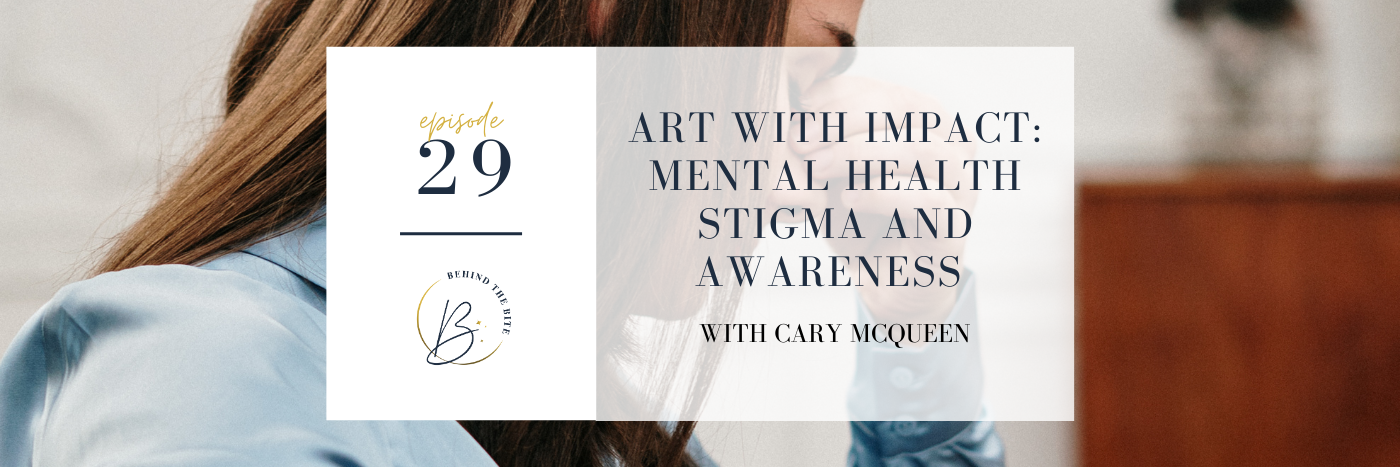Why is working to solve stigmas a complex problem that requires a personal solution? Why is representation important? Can you improve your treatment by viewing yourself as a separate entity from your diagnosis?
In this podcast episode, Dr. Cristina Castagnini speaks with Cary McQueen about using art to create awareness around the mental health stigma and why representation matters.
MEET CARY MCQUEEN

Cary (she/her) is the founder and executive director of Art With Impact and a firm believer that art is the answer (and it doesn’t even matter what the question is). She considers mental health to be the foundation of all social justice and, through Art With Impact, works to create learning environments that explore this rich subject through the power of art and creativity. Since its founding, Art With Impact has gone from being a little dream in Cary’s head to an actual, impactful arts-based mental health resource serving thousands of students each year at colleges and universities throughout the U.S. and Canada and housing the most diverse library of short films about mental health issues in the world.
In previous professional incarnations, Cary was the Executive Director of the Center for Arts Management and Technology, a research center at Carnegie Mellon University (CMU); and a research advisor for students’ capstone projects in CMU’s Masters in Arts Management program. She has also worked as a consultant to nonprofit arts organizations to create programs and strategies that engage art enthusiasts in meaningful ways. With clients like The Andy Warhol Museum and EthnoGraphic Media she developed a wide-range of strategic communication programs from Internet-based donor cultivation and acquisition to grassroots film engagement campaigns.
Visit her
website and connect on
Instagram,
Facebook.
Twitter and
LinkedIn.
IN THIS PODCAST
- Mental Health Stigma
- Representation matters
Mental Health Stigma
The way that stigma impacts us is a complex situation because each person will experience different stigmas from different places depending on who they are or what they subscribe to.
This does not make it right, or any less difficult, but it is important to know that it is simply not just one problem that needs to be solved. This is where the power of art comes in: there is not just one problem, there are many and they all interact with one another.
If you want to confront what is blocking you, you have to understand you. That’s ultimately what it comes down to because nobody can tell that to you. (Carey McQueen)
For every person, overcoming mental stigma is not just one story. To be able to assist other people means that we need to first assist ourselves in knowing where we come from, what affects us, and what is going on inside of us – only then can we share awareness and support, when we are able to also support ourselves.
Representation matters
It can be damaging to people who suffer from mental illnesses to not see themselves represented in the media because it creates the idea that people of that group or culture or background
shouldn’t have that problem whereas that is completely false.
Having a wide representation means that people can have their problems validated and can see that they are being taken seriously.
However, there is a fine line between having your problems validated in a way that they become a part of who you are and seeing your problem being taken seriously in the media.
I don’t want people to become their diagnosis … I have a broken leg but with mental health it’s you know, they become their diagnosis like ‘I’m depressed’ … no, you have depression, you aren’t depression. (Dr. Cristina Castagnini)
When you take the diagnosis outside of yourself you can treat it more easily without making it seem that you as a person are not the issue, in that way, you are a person that has an issue and that issue can be treated and solved.
USEFUL LINKS
MEET DR. CRISTINA CASTAGNINI

I am a licensed Psychologist and Certified Eating Disorder Specialist.
While I may have over 20 years of clinical experience, what I also have is the experience of having been a patient who had an eating disorder as well.
One thing that I never had during all of my treatment was someone who could look me in the eye and honestly say to me "hey, I've been there. I understand".
Going through treatment for an eating disorder is one of the hardest and scariest things to do. I remember being asked to do things that scared me. Things I now know ultimately helped me to get better. But, at the time, I had serious doubts and fears about it.
If even one of my providers had been able to tell me "I know it's scary, but I had to go through that part too. Here's what will probably happen...." then perhaps I would not have gone in and out of treatment so many times.
My own experience ultimately led me to specialize in treating eating disorders. I wanted to be the therapist I never had; the one who "got it".
I will be giving you my perspective and information as an expert and clinician who has been treating patients for over 2 decades.
But don't just take my word for it...keep listening to hear the truly informative insights and knowledge guest experts have to share.
I am so happy you are here!
THANKS FOR LISTENING
Did you enjoy this podcast? Feel free to comment below and share this podcast on social media! You can also leave a review of
Behind The Bite on Apple Podcasts (previously) iTunes and subscribe!
 Cary (she/her) is the founder and executive director of Art With Impact and a firm believer that art is the answer (and it doesn’t even matter what the question is). She considers mental health to be the foundation of all social justice and, through Art With Impact, works to create learning environments that explore this rich subject through the power of art and creativity. Since its founding, Art With Impact has gone from being a little dream in Cary’s head to an actual, impactful arts-based mental health resource serving thousands of students each year at colleges and universities throughout the U.S. and Canada and housing the most diverse library of short films about mental health issues in the world.
In previous professional incarnations, Cary was the Executive Director of the Center for Arts Management and Technology, a research center at Carnegie Mellon University (CMU); and a research advisor for students’ capstone projects in CMU’s Masters in Arts Management program. She has also worked as a consultant to nonprofit arts organizations to create programs and strategies that engage art enthusiasts in meaningful ways. With clients like The Andy Warhol Museum and EthnoGraphic Media she developed a wide-range of strategic communication programs from Internet-based donor cultivation and acquisition to grassroots film engagement campaigns.
Visit her website and connect on Instagram, Facebook. Twitter and LinkedIn.
Cary (she/her) is the founder and executive director of Art With Impact and a firm believer that art is the answer (and it doesn’t even matter what the question is). She considers mental health to be the foundation of all social justice and, through Art With Impact, works to create learning environments that explore this rich subject through the power of art and creativity. Since its founding, Art With Impact has gone from being a little dream in Cary’s head to an actual, impactful arts-based mental health resource serving thousands of students each year at colleges and universities throughout the U.S. and Canada and housing the most diverse library of short films about mental health issues in the world.
In previous professional incarnations, Cary was the Executive Director of the Center for Arts Management and Technology, a research center at Carnegie Mellon University (CMU); and a research advisor for students’ capstone projects in CMU’s Masters in Arts Management program. She has also worked as a consultant to nonprofit arts organizations to create programs and strategies that engage art enthusiasts in meaningful ways. With clients like The Andy Warhol Museum and EthnoGraphic Media she developed a wide-range of strategic communication programs from Internet-based donor cultivation and acquisition to grassroots film engagement campaigns.
Visit her website and connect on Instagram, Facebook. Twitter and LinkedIn.
 I am a licensed Psychologist and Certified Eating Disorder Specialist.
While I may have over 20 years of clinical experience, what I also have is the experience of having been a patient who had an eating disorder as well.
One thing that I never had during all of my treatment was someone who could look me in the eye and honestly say to me "hey, I've been there. I understand".
Going through treatment for an eating disorder is one of the hardest and scariest things to do. I remember being asked to do things that scared me. Things I now know ultimately helped me to get better. But, at the time, I had serious doubts and fears about it.
If even one of my providers had been able to tell me "I know it's scary, but I had to go through that part too. Here's what will probably happen...." then perhaps I would not have gone in and out of treatment so many times.
My own experience ultimately led me to specialize in treating eating disorders. I wanted to be the therapist I never had; the one who "got it".
I will be giving you my perspective and information as an expert and clinician who has been treating patients for over 2 decades.
But don't just take my word for it...keep listening to hear the truly informative insights and knowledge guest experts have to share.
I am so happy you are here!
I am a licensed Psychologist and Certified Eating Disorder Specialist.
While I may have over 20 years of clinical experience, what I also have is the experience of having been a patient who had an eating disorder as well.
One thing that I never had during all of my treatment was someone who could look me in the eye and honestly say to me "hey, I've been there. I understand".
Going through treatment for an eating disorder is one of the hardest and scariest things to do. I remember being asked to do things that scared me. Things I now know ultimately helped me to get better. But, at the time, I had serious doubts and fears about it.
If even one of my providers had been able to tell me "I know it's scary, but I had to go through that part too. Here's what will probably happen...." then perhaps I would not have gone in and out of treatment so many times.
My own experience ultimately led me to specialize in treating eating disorders. I wanted to be the therapist I never had; the one who "got it".
I will be giving you my perspective and information as an expert and clinician who has been treating patients for over 2 decades.
But don't just take my word for it...keep listening to hear the truly informative insights and knowledge guest experts have to share.
I am so happy you are here!


Comments